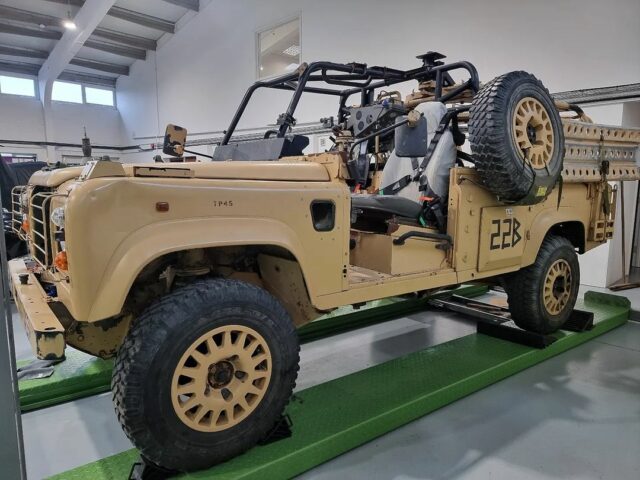It is estimated that there are currently close to 8,000 classic Land Rovers still in service within the British armed forces. Those 8,000 vehicles face an uncertain future as their aging technology becomes unreliable and, therefore, an operational and financial liability. Perhaps they can still be saved. The British Army has announced a pioneering initiative to electrify its fleet of Land Rovers. In collaboration with Electrogenic, a leader in electric vehicle conversion, this ambitious project marks a milestone in the British Army’s efforts to align with the UK’s broader environmental goals and reduce its carbon footprint. The move not only underscores the military’s commitment to eco-friendly operations but also sets a precedent for integrating advanced technology within defense logistics and operations.

Electrogenic, known for its expertise in transforming classic cars into electric vehicles, brings its cutting-edge conversion technology to the table, which will be adapted to meet the rugged and demanding military service requirements. The project aims to retrofit a significant number of the Army’s Land Rovers, replacing their traditional internal combustion engines with state-of-the-art electric powertrains. This transition promises not only to decrease greenhouse gas emissions but also to enhance the operational efficiency of these vehicles, so long as in-the-field charging options are available and reliable. The collaboration with Electrogenic involves not only the technical conversion of the vehicles but also a comprehensive support package to ensure their optimal performance and longevity in field conditions. This includes the development of portable, renewable charging solutions, allowing the vehicles to be powered in remote locations, thus maintaining the Army’s operational flexibility.

The initiative is part of the British Army’s broader strategy to embrace sustainability. The Ministry of Defence has been vocal about its intent to contribute positively to the environment while maintaining its operational capabilities. Electrification of its vehicle fleet represents a tangible step towards achieving these objectives, with the Land Rover conversions serving as a pilot project for potential future expansions to other vehicle types.
Electrification offers numerous advantages beyond environmental benefits. Electric vehicles (EVs) are known for their lower maintenance requirements compared to traditional combustion engine vehicles. This characteristic could lead to reduced operational costs and increased reliability on missions. Furthermore, the electric powertrains provide high torque from zero rpm, a feature that could prove advantageous in the varied terrains where these vehicles are deployed.



Critics of electrification in military applications often cite concerns over range and recharging infrastructure. However, the project addresses these challenges head-on. The converted Land Rovers are expected to feature advanced battery technology, offering a range that meets or exceeds that of their combustion-engine counterparts under similar conditions.
This initiative also aligns with the UK’s Defence Climate Change and Sustainability Strategy, which outlines the Ministry of Defence’s commitments to reducing emissions and adapting its practices to a changing climate. By pioneering the use of electric vehicles within its fleet, the British Army contributes to meeting these commitments and enhances its strategic adaptability by incorporating more sustainable and potentially more effective logistic solutions.
The transition to electric vehicles is not without its challenges. The adaptation of existing vehicles and the establishment of a supportive infrastructure require significant investment and innovation. This project is anticipated to catalyze broader changes within the defense sector and beyond. As one of the first of its kind at this scale within a military context, it sets an example for other nations and sectors to consider electrification as a viable and beneficial option. The success of this initiative could encourage further investment in sustainable technologies and practices, leading to broader adoption across global military operations.
Hopefully, this technology will become commercially available for classic Defender owners who like to drag their iconic vehicles kicking and screaming into the future.
Read More: Hard-Shell Rooftop Tents : Buyers Guide
Our No Compromise Clause: We do not accept advertorial content or allow advertising to influence our coverage, and our contributors are guaranteed editorial independence. Overland International may earn a small commission from affiliate links included in this article. We appreciate your support.


